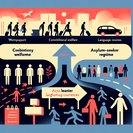
In its weekly immigration bulletin on 20 November, Crown World Mobility highlighted fresh data from the German government showing more than 70,000 national-visa applications have been submitted entirely online since the digital platform went live in February. The figure covers skilled-worker, student and family-reunification categories and represents about 45 % of all D-visa volume to date in 2025.
Officials credit the uptake to mandatory e-filing rules at high-volume posts in India and Brazil and to multilingual video tutorials that walk applicants through the process. The Foreign Office says error rates on digital submissions are 30 % lower than on paper forms, freeing staff time and reducing requests for additional evidence.
![Berlin touts 70,000 online visa filings as AI upgrade enters next phase]()
The bulletin confirms that the next milestone is full integration of artificial-intelligence tools—now in pilot—into every embassy by late 2026. AI will auto-classify documents, spot fraudulent bank statements and generate risk profiles, feeding into the fast-track pathway unveiled this week. The government argues that combining AI with front-end digitalisation could cut average processing times for skilled-worker visas to four weeks.
For corporate mobility teams, the message is twofold: first, begin collecting data in digital-friendly formats (PDF/A, verifiable QR codes) to maximise the chance of landing in the fast lane; second, prepare for stricter scrutiny of document authenticity as AI flagging becomes standard.
Crown advises employers to audit their relocation vendors for compliance with Germany’s new upload specifications and to encourage assignees to opt in to automated processing where available.
Officials credit the uptake to mandatory e-filing rules at high-volume posts in India and Brazil and to multilingual video tutorials that walk applicants through the process. The Foreign Office says error rates on digital submissions are 30 % lower than on paper forms, freeing staff time and reducing requests for additional evidence.

The bulletin confirms that the next milestone is full integration of artificial-intelligence tools—now in pilot—into every embassy by late 2026. AI will auto-classify documents, spot fraudulent bank statements and generate risk profiles, feeding into the fast-track pathway unveiled this week. The government argues that combining AI with front-end digitalisation could cut average processing times for skilled-worker visas to four weeks.
For corporate mobility teams, the message is twofold: first, begin collecting data in digital-friendly formats (PDF/A, verifiable QR codes) to maximise the chance of landing in the fast lane; second, prepare for stricter scrutiny of document authenticity as AI flagging becomes standard.
Crown advises employers to audit their relocation vendors for compliance with Germany’s new upload specifications and to encourage assignees to opt in to automated processing where available.









